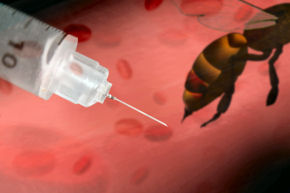
Researchers from the University of California – Irvine (UCI) have created the first “plastic antibodies” to be successfully employed in live organisms – stopping the spread of bee venom through the bloodstream of mice.
The tiny polymeric particles – just 1/50,000th the width of a human hair – were designed to match and encase melittin, a peptide in bee venom that causes cells to rupture. Large quantities of melittin can lead to organ failure and death.
The polymer nanoparticles were prepared by molecular imprinting, a technique similar to plaster casting. UCI chemistry professor Kenneth Shea and project scientist Yu Hoshino linked melittin with small molecules called monomers, solidifying the two into a network of long polymer chains. After the plastic hardened, they removed the melittin, leaving nanoparticles with minuscule melittin-shaped holes.
When injected into mice given high doses of melittin, these imprinted nanoparticles enveloped the matching melittin molecules, capturing them before they could disperse and wreak havoc, greatly reducing fatalities among the rodents.
Unlike natural antibodies produced by live organisms and harvested for medical use, synthetic antibodies can be created in laboratories at a lower cost and have a longer shelf life. “The bloodstream includes a sea of competing molecules, such as proteins, peptides and cells, and presents considerable challenges for the design of nanoparticles,” Shea explained. “The success of this experiment demonstrates that these challenges can be overcome.”
Related:
Nanoparticle Laced Wastewater Could Compromise Treatment Plants
New concerns over nanosilver
Nanoparticles Transport Gene Therapy








Comments are closed.